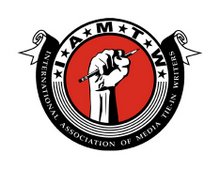Surprisingly, my in-box has recently been filling up with e-mails from people who think they would like to try writing media tie-in books and want to know how one gets started in the field. I've had the question once or twice in the past, but since it's suddenly becoming more common, I thought I would post my response to one of them here--so that I can simply point at it in the future, rather than writing it out every time.
If any other tie-in writers have additional tips, please put them comments to this post, or in a separate post of their own.
The key fact to keep in mind about writing official tie-in fiction is that it's licensed. That means that (for a price) a publisher has licensed the rights to publish the novels from the (in the case of TV shows--the process is essentially the same for books based on comics, games, movies, etc.) TV production company or network that owns the original show, or the "property."
Once a publisher gets the license, then an editor working for that publishing company looks for writers to write the novels. The writers are approached and offered a contract before even beginning to write the novel--it's the reverse of the usual novel-writing approach of writing a book and then looking for a publisher. This means that for the most part, tie-in writing jobs go to writers of whom the editor is aware.
When a writer has reached a deal with the publisher, the first step is a detailed outline, which the publisher then gets approved by the licensor (the TV network or production company). If the outline is approved then the writer can get busy writing the book. When it's done, the whole thing goes in for approval, and then is eventually published.
What this means for new writers is that the first thing you need to do is to become known to editors. This can best be done by developing a track record of professional publications, either with original novels, short stories, games, comic books, or some combination thereof. Then you can go to editors with a proven history of being able to write publishable material.
There are occasional opportunities in tie-in work for new writers. I believe there's an annual Star Trek short fiction anthology, for example, that accepts the work of previously unpublished writers. There might be more such anthologies around. And the occasional novel line that will accept proposals from new writers, too. It can't hurt to figure out who the editors for the novel lines that most interest you are and dropping them a note asking if they're accepting proposals--the worst they can do is say no, and then you've started the process of making yourself known to them, so that when you come back later with some professional credits under your belt, they'll remember you.
Finding out who edits what can be a challenge, but you can start by checking acknowledgments and dedications in the published books, and of course those ever-handy search engines. As a last resort, you can call or write to a publishing company and ask whoever answers.
New review of KORAK AT THE EARTH'S CORE!
-
Thank you so much to Carlos M. Fernandez for his 5-star Amazon review of KORAK
AT THE EARTH'S CORE!
Carlos M. Fernandez
[image: ⭐️][image: ⭐️][image:...
4 weeks ago








4 comments:
I believe there's an annual Star Trek short fiction anthology, for example, that accepts the work of previously unpublished writers.
The Strange New Worlds competition has been discontinued last year.
Pocket did have a Star Trek short fiction anthology contest, STRANGE NEW WORLDS, but it ended in 2007 after the publication of the tenth volume in the series. Heck of a run, though, and a feat yet to be duplicated (or even attempted, to the best of my knowledge) by any other tie-in licensee.
The Star Trek short story anthology, "Strange New Worlds," published its last collection in 2007.
It was a great way to get to meet those involved in Trek fiction.
Yeah, this can be a bit of a tough road. The conventional advice is that if you don't have any published credits to your name, trying to start out with licensed fiction is well-nigh impossible. Of course, that didn't stop me from trying. The first novel I ever wrote was STAR TREK, and I cranked out two more before ever publishing a single word professionally.
That said, the second TREK novel I wrote did manage to work itself all the way up to the senior editor before it got rejected. Of course, that was back in the days when Pocket employed freelance readers to go through the slush pile to see if there were any gold nuggets in there. I just happened to catch the attention of one of these readers, who bucked it on up the line. Whether the publishing houses even do this anymore is something I don't know--but I kind of doubt it, given the sheer number of experienced writers out there and the limited number of publishing slots available.
I did, however, eventually land a contract to write a STAR TREK novella for next year's anthology THE SEVEN DEADLY SINS--but that was only after I had published two original sci-fi novels with Random House. I had my agent send them over to Pocket's TREK editor, and he liked them enough to ask me to contribute to the anthology. It's the old Catch-22: How do you get published? By having something published before!
Like I said, it's tough--but it can be done. You just gotta have a lot of patience.
Post a Comment